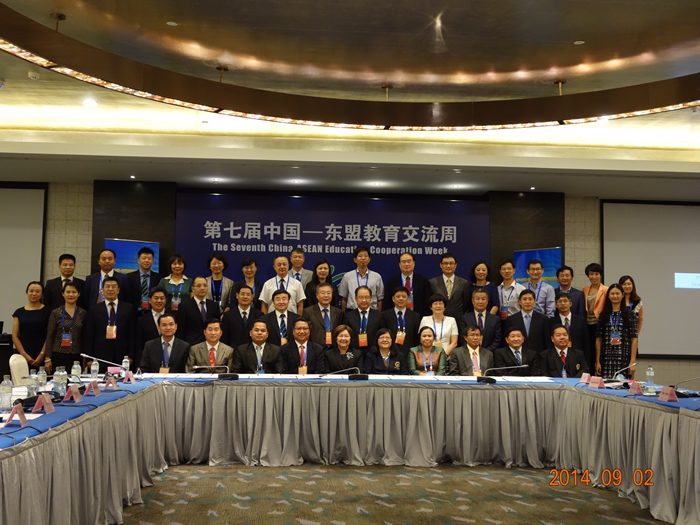
September 2, 2014, marked the opening of the 2014 ASEAN-China University Presidents Forum on International Cooperation at the Guiyang International Eco-Conference Center of Guizhou Province, which was co-organized by ASEAN-China Center, SEAMEO RIHED, and E9 University Consortium, and supported by Guizhou Institute of Technology. The forum attracted presidents and representatives from over 30 universities within China and ASEAN countries. Chen Mingming, Vice Governor of Guizhou Province, Ma Mingqiang, Secretary General of ACC, and Chantavit Sujatanond, Special Advisor to SEAMEO RIHED, addressed the opening ceremony. Zhong Denghua, Academician and Executive Vice President of Tianjin University (TJU), Mongkol Techakumphu, Vice President of Chulalongkorn University, and Yuan Si, Vice President of Tsinghua University, made keynote speeches.
As an integral part of China-ASEAN Education Cooperation Week, the 2014 ASEAN-China University Presidents Forum on International Cooperation is committed to establishing a platform for mutually beneficial international cooperation and exchange between universities of China and ASEAN countries, especially between universities with relatively strong disciplinary advantages in engineering technology. Through the forum, the nine elite Chinese engineering universities of the Excellent Alliance of Universities (E9) and the eight ASEAN universities came to an agreement regarding cooperation and exchange under the framework of ACNET-EngTech, laying a solid foundation for the two sides’ substantial collaboration.
Vice Governor Chen pointed out that, as geographical neighbors, China and ASEAN countries were economically and culturally connected with a long history of friendly ties. This educational cooperation has strongly supported the two sides in achieving leapfrog development in the “Golden Decade” and provided excellent talent for their eco-social development and bilateral trade. He hoped that the attendees would, themed around “Hand in Hand, Education for the People”, deepen the partnership with ASEAN countries in language teaching, student exchange programs, technological innovation, and training of technical talent, making positive and unremitting efforts towards regional benefits and progress on both sides.
In his address, ACC Secretary General Ma emphasized the goal of establishing ACNET-EngTech. He also expected that the forum would better serve for China-ASEAN education cooperation and promote mutual learning in related fields, so as to provide intellectual support for all ASEAN countries’ economic growth.
During keynote speeches, TJU Executive Vice President Zhong, reflecting on the mission of universities, elaborated on what challenges TJU met in training engineering talent. He introduced how TJU trained engineering talent through promoting university-industry cooperation with collaborative innovation and expressed his expectation to strengthen talent training and research cooperation with ASEAN universities.
Afterwards, presidents of participating universities held discussions concerning “International Cooperation and Exchange and the Training of Engineering Talent”, “Cooperative Scientific Research and Training of Engineering Talent”, and other themes. With the signing of the “The Joint Declaration of ASEAN-China on Establishing a Network for Cooperation and Exchange among Engineering and Technology Universities (ACNET-EngTech)”, they reached a consensus on the accessibility of courses, mobility programs, financial support, double degree programs, and information sharing.
From 2008 to 2014, the Ministry of Education, the Ministry of Foreign Affairs, and the Government of Guizhou Province have successfully co-held China-ASEAN Education Cooperation Week seven times, establishing the first platform for China-ASEAN educational exchanges. The first six education weeks were participated in by over 200 universities, research institutes, educational institutions, and enterprises. A total of 386 agreements on educational cooperation have been signed to facilitate educational cooperation between China and ASEAN countries.